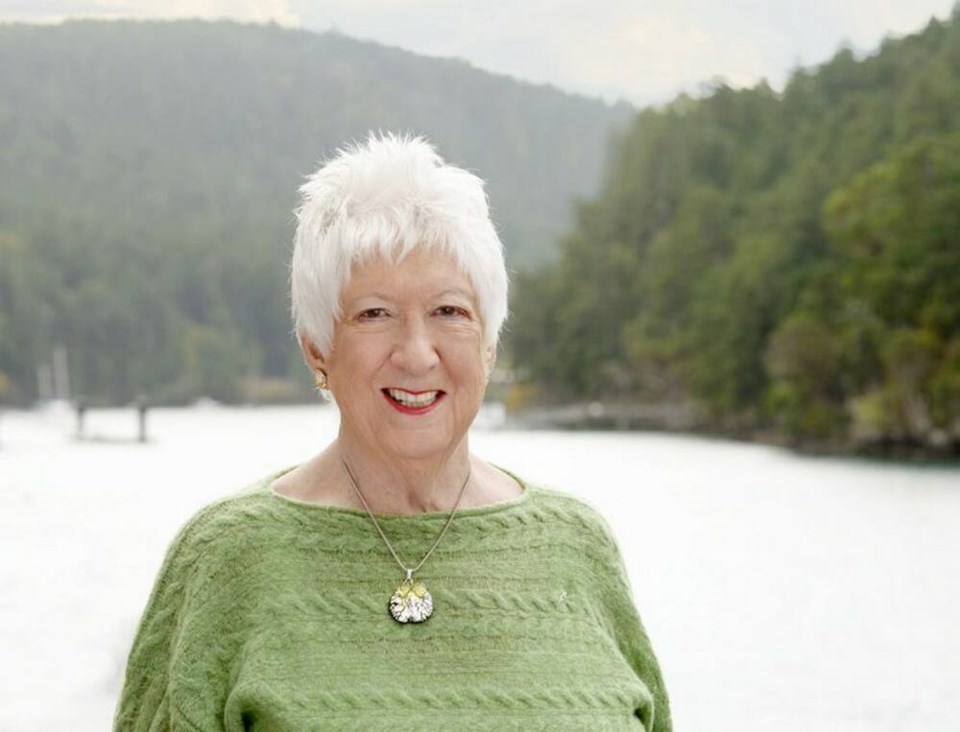Pat Carney, a former federal cabinet minister, senator and long-time Saturna Island resident, died Tuesday at the age of 88.
Long-time friend Richard Blagborne said Carney died in Vancouver surrounded by friends.
Carney, a mother of two, was elected in 1980 as the Progressive Conservative MP for Vancouver Centre and served as Canada’s trade minister under Brian Mulroney when the North American Free Trade Agreement was negotiated.
She was a senator from 1990 to 2008, championing issues important to West Coast residents. She fought to conserve lighthouses with a bill that allowed members of the public to petition for heritage designation for lighthouses that possessed significant heritage value.
Carney was born in Shanghai, China in 1935 and grew up in the Kootenays.
She became a business columnist for the Vancouver Sun before starting an economic consulting company in northern Canada and eventually made her way into politics.
After retiring, she remained active in community life on Saturna.
Her house was always busy with visitors dropping by to talk about the community’s issues, Blagborne said.
“People were always there to either try and get her engaged in some issue on the island or trying to get her help, or she was just asking people to come down because she had some concerns or some feelings about issues,” he said.
She was chair of the Island Water Commission and and honorary patron of the Saturna Heritage Committee.
Blagborne remembered his friend of 30 years as a “feisty” woman who stood up for women’s rights and blazed a path for young women politicians as the first woman in many male-dominated fields.
Carney was the first woman elected as a Progressive Conservative member of parliament in B.C. and the first B.C. woman in the party appointed to the Senate, according to her website.
“I have always delighted in provoking her to tell some stories, because once you got her going, she had a lot of stories about a lot of different aspects of a very, very diverse and interesting life,” Blagborne said.
She would tell the Senate in her 2007 retirement speech that she never intended to get into politics. “As a journalist, I sat in the press gallery … looking down literally and figuratively on the MPs while Dief the Chief jiggled his jowls,” she said, referring to former prime minister John Diefenbaker.
Her website says Carney was the first woman in every government portfolio she held, serving as the minister of energy, minister of international trade and president of the Treasury Board in Mulroney’s cabinet.
Carney pioneered the development of distance learning, and in 1977 received a B.C. Institute of Technology award for innovation in education.
Janice McAdam, Carney’s former assistant, said in a statement that Carney had been in and out of hospital recently and was readmitted over the weekend.
McAdam said the family is not planning a public memorial because Carney had said she preferred an event with only family and friends.
After retiring from politics, Carney continued to contribute to newspapers. Last year, she wrote about “the most chilling moment” of her political career, when she voted against her own government’s anti-abortion bill in 1991.
The bill came within a single vote of being enshrined in law.
“There was no doubt about how I would vote. I had told my voters that I believed a decision on an abortion was the right of a woman, her conscience and her doctors,” she wrote in the Globe and Mail.
“For personal reasons, I would not have an abortion, but that was my choice; I knew other women had their own reasons to make a different one.”
As the minister of energy, mines and resources, Carney was responsible for dismantling the National Energy Program and replaced it with the Western Accord, which deregulated the oil and gas industry, her website says.
As minister of international trade, Carney was responsible for the free trade negotiations with the United States.
Senator Hugh Segal said her role in the free trade negotiations “was seminal, clear cut and demanding.”
“She brought a Pacific-coast sensibility to discussions that would have been otherwise only about Central Canada, as is often the case in this city,” Segal told the Senate in 2007.
Carney also initiated a task force on barriers to women in the public service during her tenure as president of the Treasury Board, her website says.
Carney said in her farewell speech to the Senate that her favourite story about entering politics came when she tried to shake the hand of an elderly woman in downtown Vancouver in 1979.
“The benign-looking senior snatched her hand away and snapped viciously: ‘I would rather my hand withered and dropped off before shaking hands with a Conservative.’ She then walked away,” Carney said.
>>> To comment on this article, write a letter to the editor: [email protected]


